Adult life begins at 30, they say, or slightly earlier if you live in Moscow. As part of our week-long focus on life in the city we’ve taken stock of Muscovites who’ve achieved notoriety in their 20s, contributing to a different Russia from the one we’re used to reading about.
From the creatives giving a voice to the disenfranchised post-Soviet youth; the young politicians repeatedly harassed and arrested; the independent journalists taking on the might of Russia Today and one of the city’s newest arrivals – a whistleblower responsible for blowing open one of the biggest stories in the last decade, here are Moscow’s 30 under 30.
Politics
1. Maxim Katz, ex-poker player and politician
“This body [Moscow district council] is completely useless. It possesses no power whatsoever.” With this unusual campaign slogan, Max Katz ran successfully for the Shchukino municipal council in Moscow at the age of 27.
He told the media he won because he “chose to be honest” but also because people “wanted to see a fresh face”. Katz, now 30, is not a normal Russian politician by any stretch of the imagination. He’s a former national poker champion who funnelled his winnings into his campaign.
— Максим Кац (@max_katz)
May 29, 2015Забавнее было бы только разве что эту фотку поставить 🙂 5 сентября 2013 года pic.twitter.com/tPDmkskyEn
He has since become a popular opposition politician, activist, blogger in Moscow. In recent who’s-who guide to the Russian opposition he put forward a strategy for the presidential election in 2018. Victory is possible, he argues, if opposition groups work together. “[The opposition] is absolutely not weak, as the state tries to say. And it can win.”
2. Isabelle Magkoeva, the rising star of Russia’s left
— Изабель Магкоева (@isabelmagkoeva)
April 20, 2015испытываю предельные дозы ультракаина в рот pic.twitter.com/0PxFc1BCyX
Twenty-four-year-old Isabelle Magkoeva likes boxing and loves communism, according to her Twitter bio.
The former teenage model began to be noticed in opposition protests around 2010 and has since become the rising star of Russia’s political left. She is often compared to Chilean student protester-cum-communist politician Camila Vallejo, perhaps because both women attract attention for their appearance as well as their politics.
Communism suffered a blog with the fall of the Soviet Union, but Magkoeva has been named in the Russian press as integral to a “rising red dawn” and has been quoted calling Lenin a “great revolutionary”.
3. Ilya Yashin, opposition politician
“Boris Nemtsov was killed in act of terror,” said Ilya Yashin, his close political ally and friend.
The young activist and member of the opposition RPR-Parnas party was at the scene within 20 minutes of Nemtsov’s murder and led efforts to complete his report, Putin.War, on Russia’s military involvement in Ukraine. “It was my duty to the memory of my dead comrade to take this work to its end,” Yashin told Radio Free Europe/Radio Liberty.
— Илья Яшин (@IlyaYashin)
May 13, 2015Завтра вместе с Андреем Пивоваровым презентуем доклад #ПутинВойна в Петербурге. Аккредитация по телефону: 89119899456 pic.twitter.com/4y6uwXCSeD
Now 31, Yashin developed his political career in his 20s, leading the youth wing of the democratic Yabloko party before joining RPR-Parnas. He was once famously “honey-trapped” by a woman working for the intelligence services, had faeces dumped on his car and been verbally attacked by pro-Kremlin youth activists.
4. Edward Snowden, whistleblower
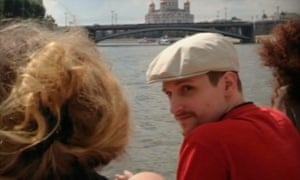
Edward Snowden was 29 when he blew the lid on mass snooping at the hands of his employer the US National Security Agency. Two years on, the US senate has just passed a bill to end the mass collection of phone records and the whistleblower says he is working harder than ever before.
Within months of talking to the Guardian his revelations had gone stratospheric and he’d moved from a secret place in Hong Kong to Moscow to request political asylum.
Bar a sighting of him on the Moskva river, his life in the city was conducted discreetly until the documentary CitzenFour revealed that his long-term girlfriend had moved to be with him. Snowden’s original confidente, former Guardian journalsit Glenn Greenwald, described their life as a “domestic bliss” which he hoped would “forever put to rest the absurd campaign to depict his life as grim and dank”.
Culture
5. Avdotja Alexandrova, founder of a ‘normal’ modelling agency
Lumpen is a Russian modelling agency challenging the contemporary conceptions of beauty. Set up by Avdotja Alexandrova at the age of 24, it now has a look book of models from Moscow to Minsk.
Models have frizzy hair, bags under their eyes, and scratches on their faces. Not because they’ve been “dressed-down” to look normal, she says, but because they that’s the way they are.
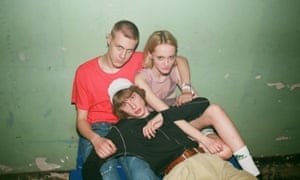
For Alexandrova, an “emotionally inexpressive face, no matter how regular or symmetrical the features, cannot be beautiful”. Whilst this is a look favoured by the mainstream fashion industry, there a small signs that things are changing. “A lot young russian brands are interested in our models”, she says.
Alexandrova divides her time between Lumpen and making films, and is currently working on her first feature due to be completed this year.
6. Alina Gutkina, radical youth artist
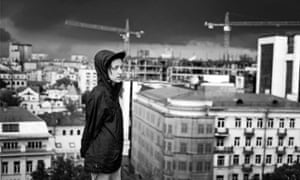
Alina Gutkina, 30, is a Moscow-based artist focused on the “radical youth” of Russia’s suburbs. Her photos hone in on the “cult of masculinity” amongst the generation born as the Soviet Union fell apart: they show a disaffected urban existence amongst graffiti, hanging around on train tracks and playing with guns.
7. Gosha Rubchinsky, post-Soviet fashion designer
Rubchinskiy menswear line in Paris
Clean lines, tattoo inspired socks, white tracksuits and chipped nail polish, Gosha Rubchinskiy’s fashion has a distinctly post-Soviet feel. The 30-year-old designer’s creations are stocked from South Korea to Sweden and last year to took a crew of street-cast Moscow skaters to launch his 2015 menswear collection in Paris. Like Gutkina his art focuses heavily on the urban boys of post-Soviet Russia.
8. Katya Quel, street artist
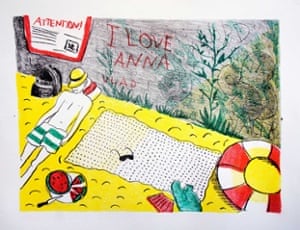
Katya Quel, or Quelish, age 28, is a young street artist based in Moscow who has a particular penchant for painting Octopuses on Moscow’s city walls, creating mashups of famous images – including the infamous Putin-hugs-koala – and Instagram selfies.
9. Tigran Avetisyan, fashion designer
The 27-year-old Tigran Avetisyan caught the attention of the fashion world by using his designs as walking protests. He chalked “no jobs”, “stop dreaming” and “too much pressure” on his spring-summer collection, reflecting the realities facing students arond the world today. Avetisyan studied at London’s Central St Martins art school.
“He has always been bit of rebel”, says The Calvert Journal in a recent profile of his latest work – a video mocking the marketing techniques of fashion houses. The designer, originally from St Petersburg, now calls Moscow his home.
10. Masha Demianova, fashion photographer
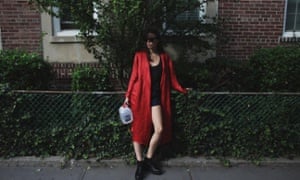
Born and raised in Moscow, Masha Demianova got her first camera at 14. Now aged 24, she is said to be “pioneering female gaze photography” in Russia. She’s a fashion photographer by trade but also shoots portraits which, unlike Rubchinsky and Gutkina, lean towards coming-of-age girls not boys. She also curates RYE, a “virtual community” mentoring young photographers from across Russia and Ukraine.
11. Valeriya Gai Germanika, film-maker
The enfant terrible of Russian film, Valeriya Gai Germanika started making movies at 19. By the time she was 30 she had directed eight films and starred in three. She won international acclaim and a slot at Cannes for her first feature in 2008, Everybody Dies But Me, or Vse Umrut A Ia Ostanius.
The coming-of-age Russian drama charts the life and survival of three young teenage girls living a brutalist Moscow suburb. She then turned her hand to TV, filming two series, School, also about teenagers, and A Brief Guide to a Happy Life, Kratky kurs schastlivoy zhizni, a story of love and work in Moscow. She has just turned 31.
12, 13. Maiden Obey, DJ and art duo
Dasha Utchka and Anastasia Pilepchuk, both in their mid 20s, only started DJing in 2013 but their infectious “young and wild” style has quickly secured them a place on Moscow’s notoriously exclusive club scene. They crafted a mixtape for Calvert Journal this month, comprised almost exclusively of Russian producers because “Russian electronic music is developing really quickly and is in quite a good place at the moment”. The pair also founded of popular erotic online magazine, Areola.
14. Lapti, DJ, ‘the voice of the Moscow suburbs’
Moscow’s identikit suburbs are the city’s most creative hotspots, giving a new generation of Russia creatives the space to be “honest” about modern life, says Anastasiia Fedorova from the Calvert Journal.
Lapti, is one of these, a music visionary who’s been called the “voice of Moscow’s suburbs”.
Lapti specialises in using 80s sci-fi soundtracks, 90s jungle rave tracks and naughties in Russian drum’n’bass and making them sound relevant to the city today. Last FM have described him as a “credit to Moscow’s beat scene”. Ahead of a recent Boiler Room performance – which recently launched in the city, he listed Russian 90s and Soviet pop in his musical influences.
Lapti doesn’t think the world pays enough attention to Russia’s underground music scene: “But that’s what makes it underground.”
Media
15, 16, 17. The Dzyadko brothers
The Dzyadko brothers are part of a young, liberal media dynasty. Tikhon, 28, works for TV Rain, Timofei Dzyadko, 30, is a correspondent for RBC, an independent Russian broadcaster, and Fillip, 33, runs an online education project.
For three years the brothers ran a weekly web news show called Dzyadko 3, described by Newsweek as “a de facto anti-Putin brainstorming session”, but stopped in 2013 because they got tired, says Tikhon.
To be a young journalist in Russia today is to make a choice, he explains. In state media you will get a good salary, wear nice suits, play with shiny cameras, but you are part of a huge propaganda organ.
In independent media you will have no money and you must be prepared for a continual onslaught on your character. You are called a “fascist” and a “traitor”, and there will be times when you ask yourself why you are doing this, he says.
For Tikhon the answer is simple. If you work for the state you are not “trying find the answers to difficult questions” but simply a purveyor of information, he says.
The path the brothers have taken is perhaps not surprising, his mother is a journalist and there are a number of other writers in his family. Will they work together again? “I think maybe, it was a nice experience” Tikhon says.
18. Rita Popova, editor-in-chief of Look At Me
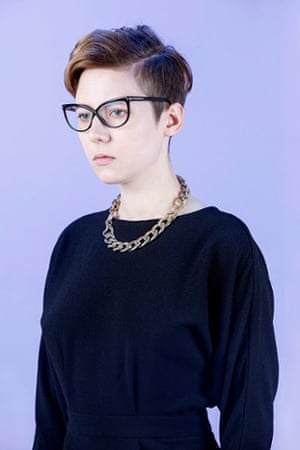
“Age doesn’t matter in the newsroom,” says Rita Popova, who was appointed editor-in-chief of cult hipster website Look At Me at 21. She is the youngest of her colleagues, aged between 16 and their mid-40s, who were all surprised by the level of Russian media attention about her age, she says.
She defines hipsters as young people who have moved from “bare consumerism” to “finding ways to change the world… Basically it’s not about drinking flat white to go anymore. It’s about making your own coffee and starting a business, even a tiny one,” she explains.
But the term hipster is problematic. It has become a label tarnished with negative connotations and “labels, whatever they are, are not cool,” she says.
And her three hot tips for being cool in Moscow? There are no rules; things go in and out of fashion too fast to bother and the most interesting subcultures can be found on the bus, she explains.
19. Daniel Trabun, editor-in-chief of Afisha
Daniel Trabun is at the helm of one of Moscow’s most influential urban lifestyle magazines, Afisha. Launched in 2000 focusing on listings, the magazine has expanded to include items such as live-streaming from Gorky Park – Moscow’s symbol of gentrification – to a feature comparing Crimean rave festival KaZantip to others around the world. The magazine also hosts a yearly festival in Moscow: the Afisha Picnic. Traburn took the helm aged 26 after launch editor Yury Saprykin stepped down expressing a wish to work “away from the Russian media”.
20. Ilya Klishin, online editor-in-chief of TV Rain
Over the past five years TV Rain has established itself as the go-to channel for independent news in a market otherwise sown up by the state. Ilya Klishin, 27, is online editor of the channel, which covers stories that others don’t dare to touch.
Klishin has contributed to a host of Russia’s other liberal media sites and was credited with the technology behind 2012’s “Big White Circle” flashmob, a human chain of individual protests around the capital’s garden ring.
21. Roman Dobrokhotov, journalist and social activist
By the age of 29 Roman Dobrokhotov had been arrested more than 120 times for a string of political performances that took aim at Putin, Russia’s Orthodox church and country’s nationalists.
“Revolution is me,” says the Twitter bio of the Moscow-based blogger, friend of Pussy Riot and the editor of The Insider, an online investigative journalism site which launched in 2013.
The journalist, now 33, penned a tongue-in-cheek open letter to Edward Snowden on his arrival in Moscow – an extended welcome assuring him that the security services were monitoring every conversation leaving “nothing here in Russia to expose”.
Entrepreneurs
22. Vladimir Shreyder, digital designer
“There is no Silicon Valley in Moscow,” says Vladimir Shreyder. “There are talented guys like Pavel Durov, the Russian Zuckerberg, there’s Yandex, but they are just Russian versions of famous worldwide projects.”
Moscow-based Shreyder, 30, is creative director of Glitché, an app which allows users to “turn images into masterpieces of digital art”, whose fans include Kim Kardashian, Lily Allen and Brooklyn Beckham.
The designer also developed SLMMSK: an “anti-selfie” app that lets users mask their identity with emojis or pixels, and Parking Douche, an app that lets people shame Moscow’s famously bad drivers – and parkers – in real time, which won the Cannes Golden Lion mobile award in 2012.
For Shreyder, who been working in digital design for 15 years, the future is all about mobile apps. But he has given up trying to get Russian investors interest. Glitché’ had no formal marketing or Russian support, it just spread virally: “People recommend it because they love it” he says.
23. Natalia Fishman, urban activist
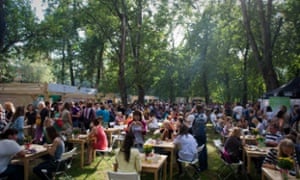
Moscow has been gentrifying at breakneck speed, from the burgeoning creative industries to the multi-million-pound makeover of Gorky Park. Much of this can be attributed to Sergei Kapkov, the city’s former culture minister – unofficially “Moscow’s Hipster Minister” – who resigned in March in this year. He was assisted by Natalia Fishman, an urban activist who, by 21 had presided over cultural projects including Gorky Park and the Jewish Museum and Tolerance centre. Now 24, she is the assistant to the president of the Russian Republic of Tatarstan
24. Eugenia Kyuda, tech entrepreneur
Co-founder of Luka, a “friendly restaurant robot taking the pain out of where-to-eat decisions”. Ask “where shall I go for dinner?” and the mobile food app will measure up the options against your search history to give you one suggestion. Moscow-born Eugenia Kudya said the app came out of his desire to put artificial intelligence to practical use.
The 28-year-old entrepreneur had previously founded Bribr: an application that allowed users to record – anonymously and safely – if they were asked to pay a bribe. It was developed with a team of Muscovite volunteers in the wake of the city’s corruption protests in 2012.
25. Sergei Berezutsky, young chef
Sergei Berezutsky is a global pioneer for modern Russian cuisine. At 28 he was voted the best young chef in the world after a two-day cook out which saw him fuse Russian and Italian ingredients. Like many chefs, he fell in love with food after helping his mother out in the kitchen as a boy. He has described his cooking style as a combination of local produce and modern technology.
26, 27, 28. Anna Bichevskaya, Aliona Ermakova and Liya Mur
Anna Bichevskaya, 34, Aliona Ermakova, 26, and Liya Mur, 26, the three women who set up Russia’s first supper club, Stay Hungry, are committed to promoting local cuisine.
The club takes place in a rented apartment with a distinct hipster hangout feel, and is as much about the social experience as the food.
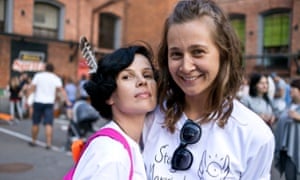
The club is also about the rise of the Moscow “foodie”, Ermakova told the Calvert Journal. Previously going to a restaurant in Russia was reserved for special occasions or if you were “showing off”, otherwise people would eat “pelmeni and potatoes at home”, she added.
They say they are keen to keep their clubs “small and special”. Would-be guests apply through a closed Facebook group in which they impose a “face control” policy favoured by the city’s bouncers: if you don’t have the right style or attitude you don’t get an invite to dinner.
29, 30. Daniil and David Liberman, tech venture capitalists
Another set of brothers to cap off the list: Daniil and David Liberman describe themselves as “serial entrepreneurs and investors”. The brothers founded Kanobu, Russia’s most popular daily gaming site, which was reported to have been brought by the search engine Rambler for $3.5m in 2011.
The pair have since set up their own tech investment site called Brothers Ventures, whose portfolio includes Coub, an app that lets you loop 10 seconds worth of video. Their biggest hit was a 10 second loop of Putin staring down Barack Obama. They have also invested in Knotch.it, a tool to monitor audience reaction to brand content, and Epoxy, a host of tools marketed at YouTubers to build their audiences.
